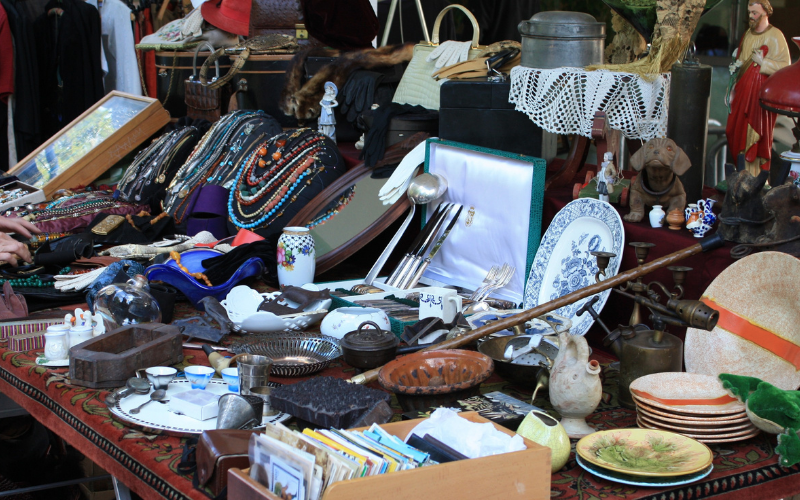When you’re dealing with a home in probate, there are a lot of questions and rules about what you can and cannot do. One of those questions that many executioners or administrators ask me is, “Can you empty a house before probate?”
What they’re usually wondering is if they can get started on emptying the house and getting the home ready for sale BEFORE they handle the probate tasks with the courts.
Generally, it’s an administrator of an estate that knows the home needs to be sold and they’re waiting for their appearance in court or for completed paperwork.
This kind of limbo makes a lot of people antsy.
But, before you touch anything in the house, it’s beneficial to know what you can and cannot do when it comes to emptying a house before probate.
What Do We Do With Contents Of An Estate House?
There’s a strong temptation to go into a home of the deceased and start gathering items. Maybe it’s the jewelry Mom promised you. Or, it’s the vintage records that Dad kept for you.
However, it’s unlikely a good idea to touch or take anything from the house. Especially, when the house is going through probate.
Before you take anything out of the home, there are a few critical steps you must take.
First, start the paperwork and file a petition for probate ASAP. You can do this on your own or consult with an attorney.
Now, depending on how the home is deeded upon the death of a loved one and other factors determine if the home is included in a person’s estate, and therefore, needs to go through probate.
If, for example, the home is deeded to an heir — mom deeds the home to all three children — then it’s probable you can begin emptying the house before probate. In this case, the house won’t go through probate.
On the other hand, if the house is included in the assets of a loved one, then the home goes through probate, and therefore, nothing should be removed from the home prior to probate.
A home going through probate requires the administrator to inventory all contents of the home. This is part of recording a person’s estate. It seems like a dumb thing to do, but this is meant to prevent any disputes between parties.
How to Empty a House After Probate
If you can’t empty the house before probate, you have to do it during or after probate. Oftentimes, a home needs to be sold to settle an outstanding debt, such as a reverse mortgage.
To sell the home, you may need to empty the house to show it to new buyers and list the property. An executor or administrator is responsible for ensuring the content of the home is properly handled. This needs court approval.
Once it’s time to empty the house, you can follow a standard process. However, dividing personal items amongst heirs and family is a complicated task.
First, go through the home and collect any paperwork that may be needed in the future. Examples are bank statements, old tax returns, personal information, insurance policies, property tax bills, and so on. Many of these items are needed to file taxes on behalf of the estate.
Next, determine how to divide personal possessions, like Dad’s goldwatch or Mom’s jewelry.
If a Will is left, then the executor must distribute items according to the Will, even if another party claims that the deceased promised the item to them.
Example: the Will states that Billy is to get Grandpa’s gold watch. However, John makes a claim that Grandpa promised John the watch before he died. Billy is legally entitled to the gold watch, even though it may have been verbally promised to John.
But, what about all of the items that aren’t mentioned in the Will? This is where things get complicated.
How To Divide Personal Possessions
There are no clear legal guidelines for how to divide personal possessions. It’s up to the Executor and the Beneficiaries to decide between themselves. You have a few options and methods for dividing up personal property that will hopefully minimize any disputes amongst the family.
I’ve seen my fair share of issues when more than one person wants a particular item.
One option is to limit the number of items each beneficiary can take. Have them list 5 to 10 items in order of their priority. These lists are then compared. If everyone has different items listed, it can make things simple.
If more than one party has the items listed, they need to negotiate between themselves until an agreement is reached.
Another option is to allocate an amount of “money” where each beneficiary can “purchase” items from the estate, which reflects their value of the estate they are entitled to.
This creates problems when some items have no real monetary value, but hold significant sentimental value. Disputes may arise when a beneficiary feels another beneficiary got more or “better” stuff.
The economic value is the same and represents the portion of estate they’re entitled to, but it won’t equal sentimental value. This happens for items where the sentimental value is significantly higher than economic value.
If beneficiaries are unable to agree, the only option may be to sell all of the items and distribute the proceeds according to their estate entitlement.
Generally, this should be the last option. If the various parties cannot agree, they may need to seek their own legal counsel.
What about Items that No One Wants?
After all personal items people want have been settled and distributed, it’s time to deal with the items no one wants. If any items hold value, they should be sold.
At this point, it’s pretty wise to call an estate sale company to come in to sell any remaining items. Any proceeds from the estate sale are distributed according to the Will.
For example, all four siblings are entitled to 25 percent of the estate. In this case, the proceeds from the estate sale are added to the estate and distributed according to the 25 percent allocation at the end of probate.
Any items that don’t hold value or left over from the estate sale should be donated or thrown away. At this point, it’s a good idea to get in touch with a junk removal company.
The estate is responsible for the cost of disposing of the items.
What Not to Do with a House in Probate
There’s a temptation to get the ball rolling when you’re in probate, but moving too fast will get you into trouble. An administrator or executor is legally responsible for acting in the best interest of the estate. They’re in charge of the estate until probate is completed.
Removing ANY item from the house before it has been approved or gone through probate creates legal issues. An executor will be held liable for any damages, lost or stolen property.
It may seem like no big deal giving out an item with no value and only has sentimental value, but you aren’t allowed to do anything without court approval.
How To Sell A Home In Probate
Need to sell the home in probate? You have a few options. Generally, it’s best to sell the home as-is and make no repairs. This simplifies the process and prevents diving into a gray area of the law.
If the house is in extremely poor condition, you can sell it to real estate investors, like the Dolinski Group. A home in fair condition can go through a traditional real estate sale.
To fix up the home, you may need court approval or to obtain signed consent from all beneficiaries before moving forward with the repairs.
An executor can take some action to repair the property before selling. However, they must be in the best interest of the estate.
This is where things get tricky. How do you define the “best interest of the estate”? Two parties may have different definitions. You open yourself up to liability should a beneficiary claim a repair or charge was deemed improper and harmed the estate.
Looking to sell your probate property in Michigan? Give one of our expert real estate agents a call.




